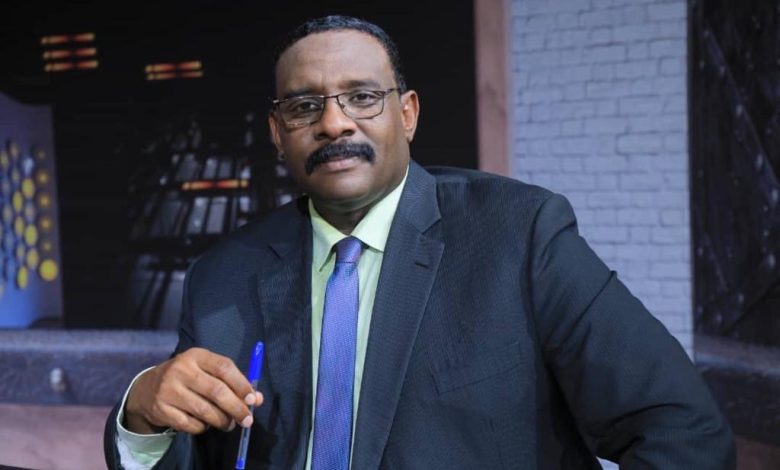“My Photos with Al-Bashir and Others…”

Diaa Al-Din Bilal
Yesterday, I posted a photo of myself with former President Omar al-Bashir on my Facebook story.
One of my sisters messaged me privately: “You, Diaa, are really bold! This photo is provocative and confirms to people that you’re a ‘Koz’!”
I replied: “What’s so provocative about it? I’m a journalist; I deal with everyone, and everyone deals with me.”
I have interviewed Al-Bashir several times, both in the air and on the ground, as well as Ali Osman, Dr. Nafi, and other leaders and figures from the former regime.
I have also had many interviews with Sadiq al-Mahdi, Dr. Hassan al-Turabi, and once with Muhammad Osman al-Mirghani.
As for Mr. Muhammad Ibrahim Naqd, I had a series of interviews with him, which were later published in the book “Naqd: Stories of the Shelters and Public Talks.”
I have interviewed leaders of the SPLM, notably Dr. Mansour Khalid, Yasser Arman, Pagan Amum, Lam Akol, and Deng Alor. I published a book on northerners in the movement, which led some of the hardline Islamists to classify me as a former communist and secretly affiliated with the SPLM!
Because I have interviewed Sadiq al-Mahdi more than others, they said I am from the Umma Party. And because I was a friend and admirer of Mr. Haj Warak, some people described me as belonging to the “Haqq” Movement!
In the final years of the Al-Inqadh regime, the National Congress Party, represented by Ibrahim Mahmoud, called for my dismissal from the editorship of Al-Sudani newspaper. To pressure this, they withheld government advertisements from the paper.
When the Empowerment Committee arrived, they confiscated the newspaper using Rapid Support Forces vehicles, and demanded my dismissal as a condition for its return.
In both cases, the honorable Mr. Jamal Mohamed Abdullah Al-Wali courageously and authentically resisted these pressures, regardless of the cost, and I will never forget this stance for as long as I live.
Post-Change
I have interviewed Engineer Khalid Omar, and we have maintained ongoing communication. I have also interviewed Sadiq Yusuf, Muhammad Diaa Al-Din, and Ibrahim Sheikh.
I sought to interview Dr. Abdullah Hamdok, but his security prevented me. However, I did receive a friendly call from him during his early days in the Cabinet through a journalist colleague.
I was also given the opportunity to interview General Abdel Fattah al-Burhan twice, in addition to three direct meetings with him.
I have photos with all of these people, and I take pride in sharing them, as they are part of a journalistic career spanning almost a quarter of a century.
All those I have interviewed – or most of them at least – know that I am a professional journalist with an independent opinion, and my stances are not driven by any partisan or political agenda.
In one of the interviews, my dear friend Bakri al-Madani asked me on his program on Omdurman channel:
“Why don’t your writings satisfy both the government and the opposition? You are caught in a crossfire between the critics and the rulers. Your journalistic battles are with both. Who are you writing for?”
The Islamists used to classify me as a communist, due to my father’s socialism and his arrest after Hashim Al-Atta’s coup, as well as the periodic visits by Nimeiri’s security men to our house. They even gave me the nickname “Diayliki Bilalov” in their wall newspapers!
Today, some attribute me to the Islamists simply because I worked in journalism during Al-Bashir’s time!
I told Bakri:
“I don’t care about the anger of the opposition, and I’m not concerned with the satisfaction or anger of the government. We write what we believe is right, without flattering anyone, and without extorting individuals or groups. We have a pen that is not flattered by praise, nor intimidated by criticism and slander. We will not lose ourselves just to gain the approval of others, nor do we seek applause by pretending to be in the frontline of struggle. Our mood and psychological composition are against extremism, against excessive hostility, or blind support. True, we may be provoked by public or private issues, injustice or slander, but we respond as the situation warrants… without vulgarity or triviality.”
During the aggression launched by the militia on the state, the nation, and the citizens in April 2023, we were – and still are – where we should be: on the side of the nation, not narrow interests.
We support the army in its battle for dignity, because there is no neutrality when it comes to homelands, and no grey area when the battle is existential.
But we support the army as an institution, not the individuals. We don’t care much about the affiliations of those fighting in its ranks, whether they are “Kozs,” communists, or others.
The collapse and defeat of the army would mean putting the final dot in the sentence of Sudan as a state and homeland, preparing for a family dictatorship that hides its faults behind some fake democrats, in the remnants of a state and broken nation.



